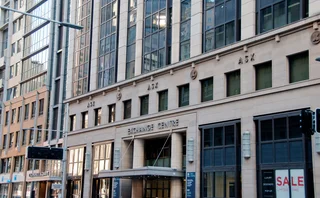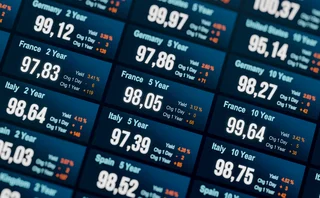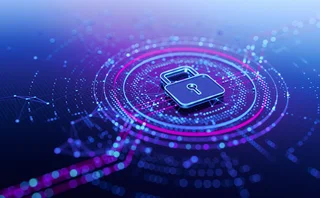All I Ask is a Tall Ship and a Star to Steer Her By

It's no secret around the newsroom that I'm a Star Trek fan, particularly the Original Series, with its dodgy costumes and haphazard special effects from the 1960s. While researching features at home I tend to have it on in the background, but last night's episode was particularly relevant to what I was reading up on.
Originally broadcast on March 8, 1968, 'The Ultimate Machine' follows the crew of the Enterprise as they trial the M-5 Multitronic System, a new computer system designed to handle ship functions without human input. Designed by a former prodigy, the M-5 works smoothly at first, but eventually goes haywire, opening fire on allied ships and disabling the Enterprise before eventually destroying itself.
Captain Dunsail
We hear a lot about the role of machines in trading, and critics of computer-based activity like to paint apocalyptic scenarios where algorithms and intelligent code run the markets, while humans are reduced to maintenance roles for the vast server farms that feed it. This was never going to be true because, like Star Trek, true artificial intelligence is science fiction.
People realize this, as well. The human layer will always be essential in any trading operation, automated or otherwise. While a computer can crunch numbers faster than any Stanford PhD, it doesn't have the experience and the analytical capability to make decisions on the same level as a person. Sure, given a set of preconditions and rules to follow, it can do so, but the person will always be obligatory.
During 'The Ultimate Machine', after the M-5 beats another starship during a wargame, the captain refers to Kirk as Captain Dunsail, a pejorative term meant to describe a part without a purpose. But what happens when the machine stops working according to parameters? On the Enterprise it means convincing it to shut down, in reality it means humans who are there to pull the plug, to call the exchange, to figure out what's gone wrong and to get out of trouble if possible.
The human layer will always be essential in any trading operation, automated or otherwise. While a computer can crunch numbers faster than any Stanford PhD, it doesn't have the experience and the analytical capability to make decisions on the same level as a person.
Knightmares
That, of course, isn't always the case. Just look at the big story from last week, which was the merger of Knight and Getco into the securities giant KCG, and the subsequent resignation of former Knight CEO Thomas Joyce. Knight's problems were more down to a lack of segregation between its testing and production environments, and the main market, but the point stands nonetheless. Without the humans to eventually pull the plug, it could have been much worse.
Given this, Kirk's recitation of John Masefield's poem 'Sea Fever', with regards his impending obsolescence, seems a touch melodramatic. We like to joke about the machines taking over, but that won't be happening for a while.
Only users who have a paid subscription or are part of a corporate subscription are able to print or copy content.
To access these options, along with all other subscription benefits, please contact info@waterstechnology.com or view our subscription options here: https://subscriptions.waterstechnology.com/subscribe
You are currently unable to print this content. Please contact info@waterstechnology.com to find out more.
You are currently unable to copy this content. Please contact info@waterstechnology.com to find out more.
Copyright Infopro Digital Limited. All rights reserved.
As outlined in our terms and conditions, https://www.infopro-digital.com/terms-and-conditions/subscriptions/ (point 2.4), printing is limited to a single copy.
If you would like to purchase additional rights please email info@waterstechnology.com
Copyright Infopro Digital Limited. All rights reserved.
You may share this content using our article tools. As outlined in our terms and conditions, https://www.infopro-digital.com/terms-and-conditions/subscriptions/ (clause 2.4), an Authorised User may only make one copy of the materials for their own personal use. You must also comply with the restrictions in clause 2.5.
If you would like to purchase additional rights please email info@waterstechnology.com
More on Trading Tech
Asic probe piles pressure on ASX to deliver Chess replacement
But market insiders think late intervention by regulators could even slow down implementation.
Stakes raised for UK bond, EU derivatives tapes after Ediphy clinches win
The pressure is on for TransFICC, Etrading, Finbourne, and Propellant Digital, who are still vying to provide the UK’s fixed income consolidated tape after Esma awarded the EU’s tape to Ediphy and its partners.
Exchange M&A, US moratorium on AI regs dashed, Citi’s “fat-finger”-killer, and more
The Waters Cooler: Euronext-Athex, SIX-Aquis, Blue Ocean-Eventus, EDM Association, and more in this week’s news roundup.
LSEG officially sunsets Eikon
The exchange operator withdrew the platform from its product lineup this week.
Cloud Wars: Are EU and APAC firms really pining for homegrown options?
Waters Wrap: In the wake of tariffs and regional instability, there’s chatter about non-US firms lessening their dependency on the major hyperscalers. Anthony is not buying it.
Bloomberg, MTS expand portfolio trading to EGBs
The platform providers will follow Tradeweb with the extension of the popular credit protocol.
Doing a deal? Prioritize info security early
Engaging information security teams early in licensing deals can deliver better results and catch potential issues. Neglecting them can cause delays and disruption, writes Devexperts’ Heetesh Rawal in this op-ed.
Google gifts Linux, capital raised for Canton, one less CTP bid, and more
The Waters Cooler: Banks team up for open-source AI controls, S&P injects GenAI into Capital IQ, and Goldman Sachs employees get their own AI assistant in this week’s news roundup.







